Best new features in iOS 8 that you should know about
Yesterday, Apple took the wraps off iOS 8 at its WWDC keynote. Considering the paucity of leaks before the event, no one really had any high hopes from the update as far as new features were concerned, which is why everyone was pleasantly surprised when Apple started firing one great new feature after another during the event that would have made even users of other platforms sit up and take notice.
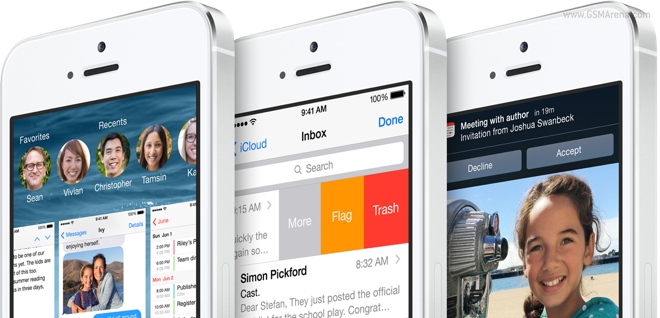
Today, we are compiling some of the truly great new features that Apple introduced with iOS 8. Note, when I say “new”, some of these may not be new in general but just new to iOS. Still, for current users of iOS, this is the kind of stuff that will keep them interested in the platform and for those on the fence or looking to switch over, these are the features that could serve as the final push. h
Extensions
I’m just going to start with what I think is the best new addition to iOS. One feature in Android that a lot of iOS users have been clamoring for was ability to apps to interact with each other instead of residing in their respective silos. This allows apps to talk to each other, thereby letting you share content from one app to another.
This is what Extensions brings to iOS. In iOS 8, apps can place an extension in the share sheet, that will allow you to share, say, a web page to any app that supports this functionality, whereas previously you’d be limited to the few built-in apps along with Twitter and Facebook. Or apps can provide specific functionality in other apps, such as the Bing Translate action Apple demonstrated during the keynote in Safari.

What this also does is let you, say, open a photo in the Photos app and then choose to edit it in a separate, third party app, such as VSCOcam. Unlike on Android, you won’t actually be leaving the app on iOS 8 and instead VSCOcam will load within the Photos app till you finish the editing work and then the UI will change to the stock Photos app UI. Same basic idea as on Android but with a better implementation. Developers can make their apps show up in Photos app for editing purposes and this also works for apps of other kinds.
Then there are widgets. Although Apple didn’t adopt the Android way of placing widgets on the home screen, you can get the same basic functionality from widgets in the Notification Center. Apps can have a widget of their own, which will show up in the widgets list and you can select the ones you want to appear in the Notification Center.
Keyboard
The stock iOS keyboard has always been very good but over time people started demanding more features, such as ability to see predictions above the key row or being able to swipe instead of typing. The keyboard in iOS 8 is hugely improved and now shows suggestions as you type. The suggestions are context aware and thus provide relevant suggestions depending upon what you are typing. It learns from your usage and improves the suggestions to match the context and your typing style.

However, if you think it’s still not good enough, you can now install third-party keyboards. Apple showed Swype during the keynote but I’m sure other keyboards such as SwiftKey will eventually make their way to the App Store. Apple by default prevents the keyboards from connecting to the internet to prevent your keystrokes from being sent out of the device but you can choose to give the keyboard access to the internet if you want.
Continuity
One advantage of making your own smartphones, tablets and computers with your own custom software means that you can do things that few others can. One such feature is Continuity, which makes moving between your various Apple devices seamless.

One of the things you can do with iOS 8 on your iPhone and iPad (and OS X Yosemite on your Mac) is start working on a document or a message on one of your device and then pick up right where you left on others. The devices constantly stay in sync with what you are doing and let’s say you’re working on a document in Pages on the iPhone and feel like finishing it off on the iPad, you’ll see an icon on the iPad’s lock screen for Pages and when you swipe it upwards, it will directly launch the app and present it in the exact same state you left it on the iPhone. This works with other things, too, such as emails and web pages.

Another spectacular addition is being able to make calls and send messages from your Mac or iPad when your iPhone is around. Let’s say you have a Mac and your iPhone is lying around somewhere and you get a call. Instead of picking up the iPhone, you get the notification to pick up the call directly on your Mac. Similarly, you can also make calls. This also works with SMS.
Want to set up a Wi-Fi hotspot on your iPhone for your iPad or Mac? You don’t have to do any actual setting up. Your iPhone will automatically appear in your Wi-Fi list on your Mac or iPad and you just click on it and the device will automatically do everything and connect to the phone.
Family Sharing
Family Sharing allows you to create a group of six people with different Apple accounts. Once you create a group, you can have all of them using one credit card. You can then share content such as music, movies, books, apps and games purchased using that card with other members of that group. If you have kids, you can prevent them from purchasing using your card. When they try to buy something, they get a message to ask you and you get a notification asking you for permission. Only with your permission can others purchase using your card, if you set it as such.
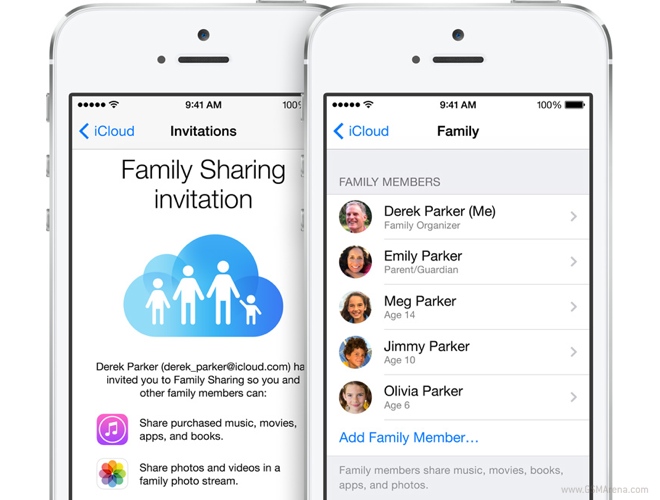
Other than the content purchased on the group, you can also share photos on your device between the account so all the family members can have all the photos. You can also have a group calendar that everyone in the group can access and add to. Lastly, you can also share location within the group so you can see where the other group members are all the time.
This is going to be great for people who all have Apple devices in the house.
Metal
For someone who plays a lot of games on the iPad, this is something that I find particularly exciting. Every time you run a 3D game on your device, it runs through a layer of OpenGL API to access the device hardware. Metal gets rid of this layer and gives the games more direct access to the CPU and GPU. This is similar to how AMD’s Mantle works on the desktop side. What this means is that games programmed for Metal will run much faster and you can have much better graphics with the same hardware than you could before with OpenGL, 10x as fast according to Apple.

Apple is already working with the top game developers and game engines to make games using Metal. Hopefully, more games will use Metal in the future. This does mean additional work for developers, as they can no longer make a game for OpenGL and have it work across platforms but it does have considerable benefits in terms of performance. If it were any other platform I’d have been skeptical about its success but it’s Apple and developers have been more than willing to go out of their way to make things work well on its platforms, especially iOS.
Currently, there are many companies making health focused devices, such as the Nike FuelBand, the Jawbone Up and the FitBit. These devices usually have their own apps, which scatters your data across the phone. What Healthkit does is provide device manufactures a place to collate all their data so it’s easier for the user to find all of it in one place. It also works with medical services that can track your health and contact a doctor if necessary for you.
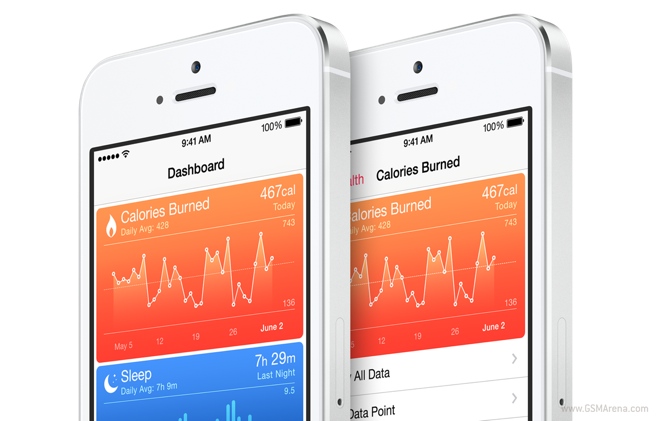
Homekit is similar, but works with home automation devices. Things such as lights and thermostats that can now be controlled by your phone but use separate apps can now plug into this one app making it easier to control all the devices in your house from one place.
Messaging
Apple has made considerable improvements to the Messages app in iOS. Those who used the iMessages service could previously make groups for multiple people to chat in one place but the execution left a lot to be desired. The latest update brings along some much needed features, such as the ability to mute a group, leave the group, remove a person from the group or share your location with your friends in the group.
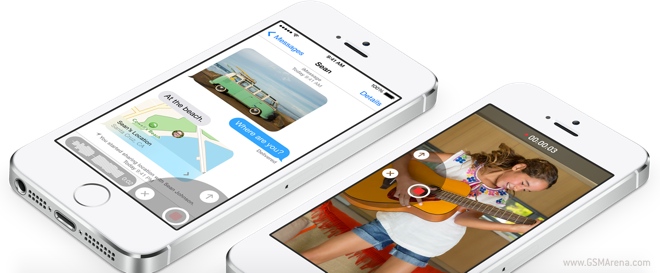
Along with that, you can now also send voice and video messages to your friends. Press and hold the microphone button above the keyboard and speak your message. You can do this for video too.
Lastly, Messages now syncs your SMS messages along with your iMessages to your iPad or your Mac, so the conversation maintains its structure and continuity across devices.
Improved Notifications
Now, when you get a notification from someone while you’re in another app, you can just pull down the toast notification that appear on top and you will get additional options to reply to the message on the spot, without having to switch apps.
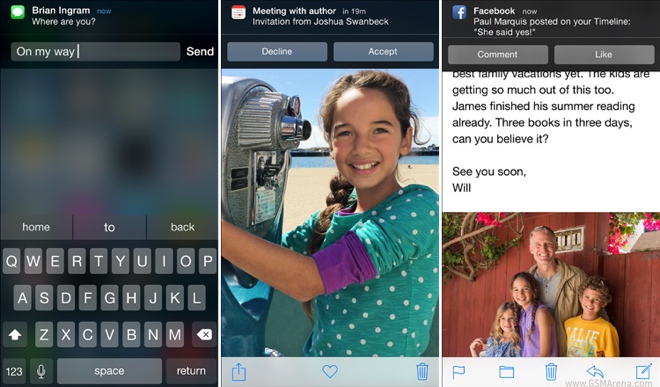
You can also swipe left on certain notifications on the lock screen to get additional options. Lastly, if you get a voice message, just hold the phone to your ear even if it’s locked and it plays for you without having to press a button.
Improved Photos app
There is now a new Photos app on iOS 8. First of all, you get iCloud Library, which syncs your photos across all your iOS devices. Even if you make an edit to your photo, the changes are synced across immediately. You can also store photos in your iCloud account and they appear on your phone along with the ones stored locally.
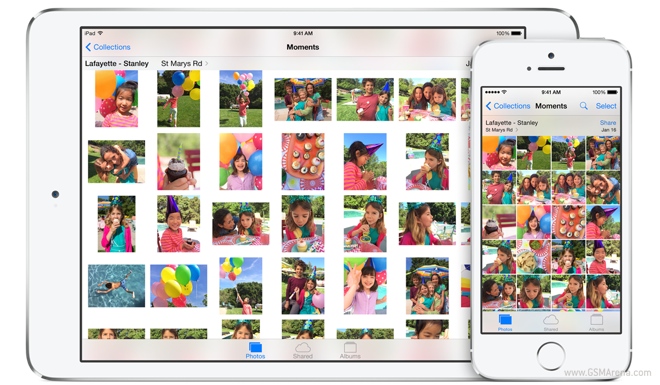
There is a new search tool that lets you find photos by just typing and as you type it will show photos from a particular date, album and even location where they were taken.
Lastly, there is a much improved photo editor built-in, with color and light adjustment, filters and horizon leveling tools.
Improved Siri and Spotlight
Siri can now be accessed by saying “Hey, Siri” when it is connected to a charger without having to press a button, which can be convenient when you’re driving. It also now shows you words as you speak them and features improved voice recognition and language support. You can now also purchase iTunes content with Siri. Lastly, you can also find out what song is playing around you using Siri, thanks to the Shazam integration.
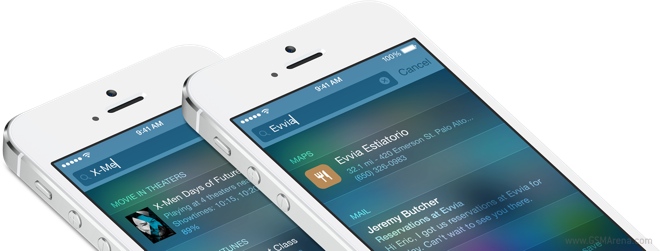
Spotlight has also been enhanced. Along with showing you local content as you type, it now taps into services such as Wikipedia, and can do Google searches on the fly as you type. It will even suggest apps, movies, music and books from the store that you don’t have on your device. A search for a movie will bring up show times and a search for a restaurant will bring up more info about the place with location.
Other than these features, there are also these other features, such as:
- iCloud Drive for storing your files on the cloud and accessing them from your iOS and OS X devices
- Touch ID now accessible to third party developers
- Swift, SpriteKit and SceneKit for better apps and games
- Time-lapse mode for videos in Camera app
- Shortcut to frequently contacted people in multitasking interface
- New swipe gestures in Mail
- New Safari interface
- Improved enterprise features
- App bundles with discounted prices
- Video preview for apps in App Store
- Braille keyboard for direct 6-dot braille input
- Private browsing per tab in Safari
- Wi-Fi calling
- iBooks built-into iOS
- Flyover city tours
- Panoramic photos on iPad
- DuckDuckGo support in Safari
- Rich text editing in Notes
- Camera timer
- Navigation and vector maps for China
- FaceTime call waiting
These are all the major features that Apple announced. There will be many more little things that we will come across as we use the OS on a daily basis but what we have above is the real deal.
You can see why it has got a lot of people excited and talking about switching over. Without a doubt, a lot of these features were present on other platforms before, specifically Android but it also plugs many of the gaping holes that have been present in the platform before.
For some, it may still not be enough but for a vast majority of the people out there, iOS 8 should now be perfectly serviceable. And with the excellent and unparalleled integration that iOS 8 and Yosemite have, some people will be more than willing to complete the set if they have one of the devices.
Featured
Categories
- Mobile phones
- Mobile software
- Mobile computers
- Rumors
- Fun stuff
- Various
- Android
- Desktop software
- Featured
- Misc gadgets
- Gaming
- Digital cameras
- Tablets
- iOS
- Desktop computers
- Windows Phone
- GSMArena
com - Online Services
- Mobile Services
- Smart Watches
- Battery tests
- BlackBerry
- Social Networks
- Web Browsers
- Portable Players
- Network Operators
- CDMA
- Windows
- Headphones
- Hands-on
 Benchmarking Asus ZenFone 2 ZE551ML with Intel Atom Z3580 SoC and 4GB of RAM
Benchmarking Asus ZenFone 2 ZE551ML with Intel Atom Z3580 SoC and 4GB of RAM HTC One M9+ preview
HTC One M9+ preview Hot or Not: Android M, iOS 9 and Watch OS 2.0
Hot or Not: Android M, iOS 9 and Watch OS 2.0 Your verdict on Android M, iOS 9 and Watch OS 2.0
Your verdict on Android M, iOS 9 and Watch OS 2.0 Xiaomi Mi 4i battery life test
Xiaomi Mi 4i battery life test
Comments
Rules for posting